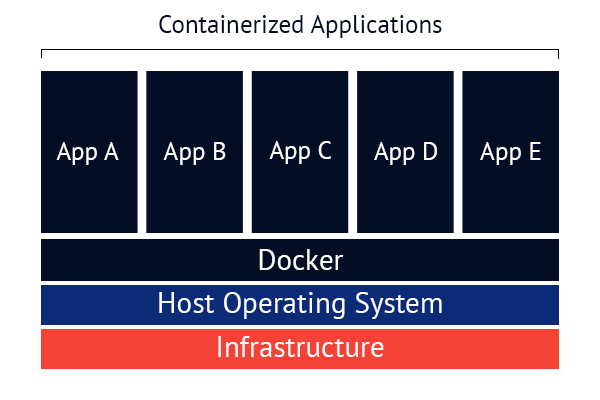“Docker container” may not be new slang for a pair of classic men’s khakis, but they are the perfect fit for many business’s tech needs. So, can Docker containers help you on Casual Friday—and every other day? Find out in this article.
Docker containers are standardized units of software that encompass an application’s code and all its dependencies. The system is virtualized, meaning it’s an otherwise fully functional environment running as a simulation inside a larger system. It is also lightweight, so it can run quickly and reliably from one computing environment to another. There is no unnecessary code or features, Docker containers only include exactly what you need. Docker containers can communicate with each other and be grouped, if necessary. They can also be created or destroyed with ease.
It is also possible to create an “image” of a container, which means you can deploy multiple copies if you want to scale up or down. For example, if you suddenly got a large increase in traffic to your website, you could automatically scale up just by creating more containers from the image.
What are the major benefits of using Docker Containers vs traditional hardware?
- Low Cost – No hardware cost! Instead of multiple servers, you only need one and can virtualize your software.
- No Hardware – Instead of bulky, costly hardware your virtualized environments can be managed easily and cheaply from any device.
- Compatibility – Pick and choose between environments quickly. If you have an app running on a particular operating system, you can create an image for that version without having to install it.
- Easy to maintain – This is something we can help with! If your IT team doesn’t have extensive knowledge in this field, Chateaux can maintain your environment for you.
- Scalable – Docker containers are easy to deploy and, therefore, easy to scale up and down.
Who would be an ideal candidate for a Docker containers project?
With its built-in containerization system, Docker is an excellent tool for cloud computing for businesses both small and multi-national. There are many instances where they would prove beneficial for your IT, but here are a few examples:
If you would like to rapidly deploy or scale down your IT, or have an uneven workload, then containers are most definitely for you. Perhaps your product or service is seasonal, or you get unpredictable spikes in demand…the flexibility of containers makes them the perfect solution for these scenarios.
Another example of when containers are a great fit is if you’d like to run multiple diverse applications that need to communicate with each other. For example, blockchain applications often run in docker containers because all the nodes must communicate.
Are there any disadvantages to using docker containers?
As previously mentioned, containers can be easily created and destroyed. It is important to be aware of this when thinking about your data. All the data stored within a container will be permanently lost once the container is shut down. Therefore, it is important that data you’d like to keep is stored elsewhere, and that containers are not used for persistent data storage.
If you’d like to know more about docker containers or the suitability for your project, then one of our experts would love to chat with you. Email us at [email protected], we are happy to help!









